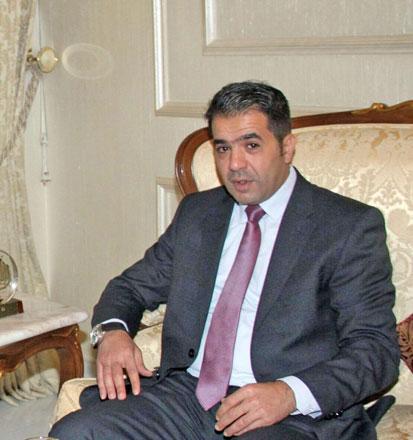You are here
‘We have the choice to sit back and act as mukhtars, or find real things to do for our city’
By Mahmoud Al Abed - Jan 22,2018 - Last updated at Jan 22,2018

Ahmad Abdallat
AMMAN — Almost six months into the country’s decentralisation experiment, members of the capital’s elected governorate council find themselves with a limited mission that, even when accomplished, would make little difference to a sprawling city overpowered by formidable challenges.
What makes matters worse, according to Amman Governorate Council’s President Ahmad Abdallat, is the “identity confusion”.
“We are 62 members; some of us think we are there as mukhtars [notables] just for the prestige, some act as MPs….The very concept of decentralistion is confused,” the 39-year-old engineer told The Jordan Times in an interview on Thursday.
“In fact, there is nothing much we do other than endorsing budget allocations suggested by the Executive Council”, which practically serves as the executive branch, headed by the governor and comprising top officials representing government agencies. The Governorate Council, meanwhile, is a legislature concerned mainly with debating the development plans set by the executive body.
“After the funds are made available [by the end of March], our job is to oversee progress in implementation and wait for the following year’s budget; that’s all,” said Abdallat, who represents the east Amman Marka district and comes from a family of housing developers.
In the 2018 budget law, the central government has allocated less than JD35 for Amman, where roughly 40 per cent of the population live, out of around JD222 million earmarked for development projects in the 12 governorates.
Under the same law, the executive council’s mandate, among others, is to prepare the governorate’s budget and draw up the development plans and then execute the decisions of the governorate council (a.k.a. decentralisation council), the majority of whose members are elected, including a women’s 10 per cent quota, while the government appoints 15 per cent of the makeup.
Voicing understanding of the budgetary constraints and the restricted mandate, the Amman council’s chief said: “We are left with the choice between sitting back as mukhtars, or doing something about it: to think big and out of the box.”
The first move the council members did, led by Abdallat, was to go to the field to have a first-hand look at the needs of the capital’s residents, especially in the underdeveloped peripheral districts.
“We talked to people and listened to complaints as well as ideas from average people. We came up with the conclusion that the focus should be on education and health: Building new schools if the geographical nature of the area allow horizontal expansion, and expand the existing schools horizontally in crowded inner-city neighbourhoods,” Abdallat said.
As for the healthcare centres, the council chief noted that in some areas outside Amman, people have to travel for long distances to reach the nearest state-run medical facilities, while within the town, the rented buildings in particular are shabby.
A good part of these woes have been responded to in the budget, but as the team travelled around the big city, they ran into an array of small and big problems and had to act on them.
“When we go into a school and see that girls are shivering from cold, there must be a solution out there. After all, many of us, including myself, have a wide network of contacts, so I called a friend from the private sector and we partnered to provide schools with stoves,” he recalled.
Another initiative was Sanad (support), in which the council, with support from Governor Saad Shihab, joined efforts with the Business Development Centre to provide 1,000 unemployed youth with training to start their own small businesses.
“What I am trying to say is that we, as elected council members, are virtually the closest to people and, at the same time, have access to decision makers, municipal authorities, corporate donors and even parties outside the country; we have our expertise in various fields as well, so the question is whether we want to serve or not,” Abdallat explained.
In a bid to help council members do their job better, two initiatives have been implemented. The first is a programme involving workshops to educate the members on the decentralisation process and their mandate. Meanwhile, a deal was concluded with Middle East University, under which the latter’s academic staff would be preparing professional studies to be at the council members’ disposal.
What is left, according to Abdallat, is an amendment to the law in a way that allows the members to propose projects ahead of the allocation process and vote, rather than waiting for the executive council to do the job exclusively.
“We have been in contact with councils in all governorates and we are reading on the same page; In fact, we have sensed a positive response from the government in that regard,” he concluded.
Related Articles
AMMAN — “I do not trust these attempts, since the main obstacle facing the newly implemented decentralisation policy, is the governmen
AMMAN — Kuluna Al Urdun Youth Commission/King Abdullah II Fund For Development on Sunday held a discussion panel on partnerships with the go
The National Goodwill Campaign on Saturday organised a free medical day at Sulaiman Nabulsi School in the Safih area in Balqa Governorate.
















